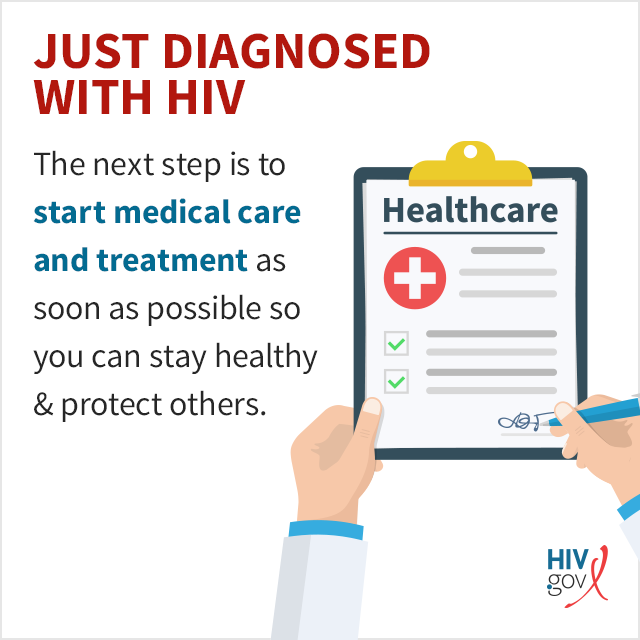Living with HIV
Topics

What’s the Next Step After You’re Diagnosed with HIV?
After you are diagnosed with HIV, it’s important to see a health care provider who can help you start medicine to treat HIV as soon as possible. Treatment with HIV medicine, also called antiretroviral therapy (ART), is recommended for all people with HIV, regardless of how long they’ve had the virus or how healthy they are.
HIV medicine can reduce the amount of HIV in your blood (also called your viral load) to an undetectable level—a level so low that a standard lab test can’t detect it. People with HIV who take HIV medicine exactly as prescribed and get and keep an undetectable viral load can stay healthy and will not transmit HIV to their HIV-negative partners through sex. There are many other benefits of starting HIV treatment early, including longer survival, lower risk of cardiovascular disease, decreased risk of severe opportunistic infections, and decreased risk of perinatal transmission for pregnant people. Learn more.
How Do You Find an HIV Health Care Provider?
If you were tested at a health care provider’s office or a clinic, you can ask if they offer ongoing health care services for people with HIV, or if they can refer you to a provider who does.
If you were tested outside of a health care setting and need to find a provider, you can find one by using our HIV Services Locator. Just enter your ZIP code to view a list of nearby HIV medical services such as Ryan White clinics for HIV care, HIV testing, housing assistance, and substance use and mental health services. Here are other ways to find HIV health care providers and services.
Your first visit with a health care provider will usually include a review of your health and medical history, a physical exam, and several lab tests. Among other topics, the provider will typically explain the benefits of HIV treatment and discuss ways to reduce your risk of passing HIV to others. In some cases, your provider may start you on ART the same day if you have not already started treatment. Before leaving your health care provider’s office, ask about your follow-up appointments and who to contact if you have difficulty getting your medications.
Read more about what to expect at your first HIV care visit.
How Can You Get Support After Your HIV Diagnosis?
Receiving a diagnosis of HIV can be a life-changing event. But having HIV does not mean you are going to die. Most people with HIV can live long and healthy lives if they get and stay on treatment.
There will be a period of adjustment. People who are newly diagnosed can feel many emotions—sadness, hopelessness, and even anger. Pay attention to your mental health. Your HIV health care provider can help you access mental health services to help you work through the early stages of your diagnosis and begin to manage your HIV.
Talking to others who have HIV may also be helpful. You are not alone. Ask your provider for help finding a local HIV support group. Learn about how other people with HIV have handled their diagnosis and their journey on treatment for HIV.
You can view video stories of how other people are living well with HIV at Positive Spin or at CDC’s Let's Stop HIV Together.
How Can You Prevent Transmitting HIV to Others?
It’s natural to be concerned about potentially transmitting HIV to someone else. It’s important to know there are ways to prevent that. The best thing you can do to prevent transmitting HIV through sex is to get on HIV treatment and get and keep your viral load at an undetectable level. This is sometimes referred to as treatment as prevention (TasP) or undetectable equals untransmittable (U=U).
It may take time to achieve an undetectable viral load. You will need to work with your provider to develop a treatment plan and manage it effectively. Almost everyone who takes HIV medicine as prescribed can achieve an undetectable viral load, usually within 6 months after starting treatment.
There are other ways to prevent transmitting HIV as well. Read our pages:
- Preventing the sexual transmission of HIV
- Reducing the risk of mother-to-child transmission of HIV
- Preventing the transmission of HIV through injection drug use
Do You Have to Tell Others Your HIV Status?
Many people who have just learned their HIV diagnosis wonder how to tell others about it. You don’t have to tell everyone that you have HIV. Whether and how you tell others about your status—also called disclosure—is your decision.
Talking to someone you trust about your HIV diagnosis can help you process your thoughts and emotions. Sharing the news or disclosing your diagnosis to your partner, a close friend, or a family member and talking about your feelings can be helpful. Your friends and family may be a good source of support. However, some people may find disclosure to family and friends difficult. It may be helpful to first talk to a health care professional, counselor, peer navigator, or a peer support group. The testing center where you received your diagnosis can connect you with options in your area.
It’s important to share your status with your current and past sexual partners and anyone with whom you have shared drug injection equipment. This way, they can be tested and seek medical attention if needed. If telling them yourself is challenging or possibly risky, your local city or county health department can notify them that they might have been exposed to HIV without giving your name and provide them with testing, counseling, and referrals for other services.
In addition, your health care providers need to know your HIV status so that they can support you and give you the best possible care.
Read more about telling others about your status and resources available to help you do so.